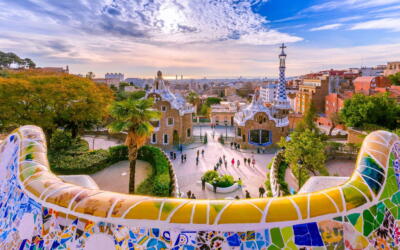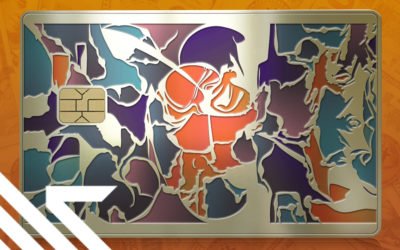Dubai city in the United Arab Emirates is a popular destination for digital nomads owing to its warm climate, enticing culture, and modern infrastructure. It offers a range of benefits for remote workers looking to work and live in a new and exciting location.
Table of Contents
- 1 The Visa application
- 2 What makes Dubai city a popular tourist destination?
- 3 Cost of living and cost of living arbitrage
- 4 The Crypto Community
- 5 The expat population
- 6 Popular recreational activities and fun spots
- 7 Transportation
- 8 How safe is Dubai?
- 9 Cultural and social norms
- 10 Political and economic stability
- 11 Language and language barriers
- 12 Dubai city’s healthcare
- 13 Electrical standards
- 14 Mobile and internet plans
- 15 Payment services infrastructure
- 16 Exchange rates
- 17 Climate and seasons
- 18 Popular cuisine
- 19 Common Concerns
In a 2022 survey by real estate consultancy Savills, Dubai ranked as the third-best city for digital nomads after Miami (Florida) and Lisbon in Portugal. In another study that analyzed 150,275 user check-ins, Dubai secured the second position in the 2021 Nomad List ranking for the world’s fastest-expanding remote working hubs.

Dubai city:
Although several cities outrank it on the Nomad List, there is little doubt that the Emirate city is a growing digital nomad magnet. As of mid-March 2023, Dubai is hosting about 6000 remote workers, and the number is likely to go up with time.
But why does Dubai city stand out as an attractive digital nomad haven? You may ask.
Let’s explore to unveil Dubai’s potential as a growing digital nomad paradise.
The Visa application
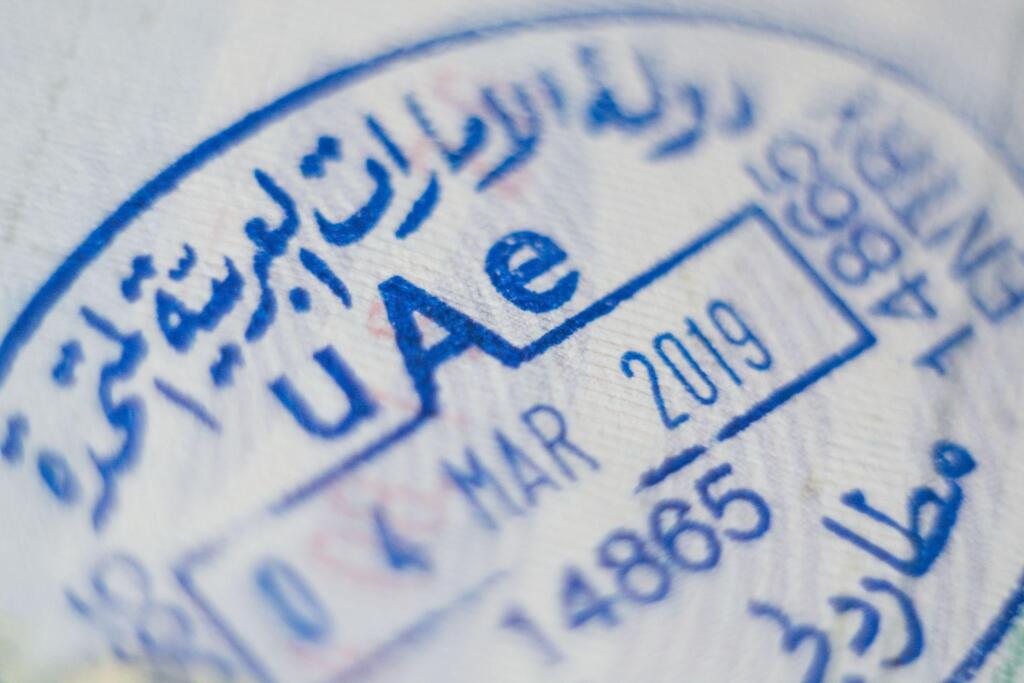
Like other countries, the United Arab Emirates Visa regime is diverse, hence able to cater to the needs of visitors jetting in for different reasons. The various types of Visas are categorized based on the purpose of your visit.
Let’s sample a few of them.
- UAE Work Visa: This visa is granted to foreign nationals who have secured employment in the UAE and have obtained a Work Permit.
- The Tourist Visa: It allows foreign nationals to enter Dubai for tourism purposes. The Dubai tourist visa is a single-entry visa, which allows the holder to enter Dubai once for a specific period, after which the visa expires.
- Visa on Arrival: It is issued upon arrival at Dubai International Airport and is available for citizens of select countries.
- UAE Family Visa: Close family members of UAE citizens or foreign residents are eligible for this visa.
- UAE Retirement Visa: This one is intended for elderly foreigners who wish to retire in the UAE and have sufficient financial resources.
- UAE Investment Visa (long-term residence): Foreign nationals who make a significant investment in the UAE can apply for this visa, which has a longer duration than other residence visas (up to ten years).
- Work Remotely from Dubai program: Also known as the digital nomad visa, this document is specifically designed for foreign freelancers who wish to work remotely from Dubai.
For the purposes of this guide, let’s focus on the work Remotely from Dubai program or the digital nomad visa.
The Dubai digital nomad visa
The Dubai digital nomad visa is an excellent option for those looking to explore the city while working remotely from a foreign country. Also referred to as The Remote Work Visa, the document enables qualifying individuals to reside and work remotely in Dubai for a maximum of 12 months. The government introduced this special visa program in March 2021 to draw in remote workers and digital nomads to the city.
The process of applying for a Dubai Digital Nomad Visa
The visa application process is relatively straightforward and can be done online through the Dubai Tourism website or registered travel agents
What are the requirements?
You must fulfill the following requirements (among others as specified by the issuing authority) to be eligible for this document.
- You must be 18 and above.
- Show proof of a remote work contract with a company outside of the UAE, or be self-employed and conduct your business outside the UAE.
- Proof of your current employment and a minimum monthly income of USD 3500 or equivalent in other currencies.
- You need a clear criminal record and provide a certificate of good conduct from your home country or country of residence.
- Have valid health insurance with UAE coverage for the duration of your stay.
- A passport with a minimum validity of 6 months.
Difficulty in the visa application
As a Digital Nomad seeking a digital nomad visa for Dubai, there are several common reasons for visa rejection to be aware of.
Firstly, handwritten passport copies are automatically rejected by UAE immigration. Therefore, ensuring that all submitted passport copies are clear, legible, and machine-readable is crucial.
Any typos or misinformation on the application can also result in visa rejection or delay. To avoid errors, double-check all information submitted, including name, passport number, profession code, and date of birth.
Thirdly, applicants with a criminal record or those who have committed fraud or misconduct in the UAE will likely face visa rejection. Therefore, it helps to disclose past legal issues and provide relevant documentation to avoid misunderstandings.
Photograph specifications are also critical. Your photograph must meet the specified requirements, including size, background, and clarity. Any blurred or incorrect photographs can result in visa rejection.
Obtaining a Dubai digital nomad visa requires careful attention to detail and adherence to all requirements. By avoiding common mistakes, including others not discussed above, you can increase your chances of a successful digital nomad visa application.
What makes Dubai city a popular tourist destination?
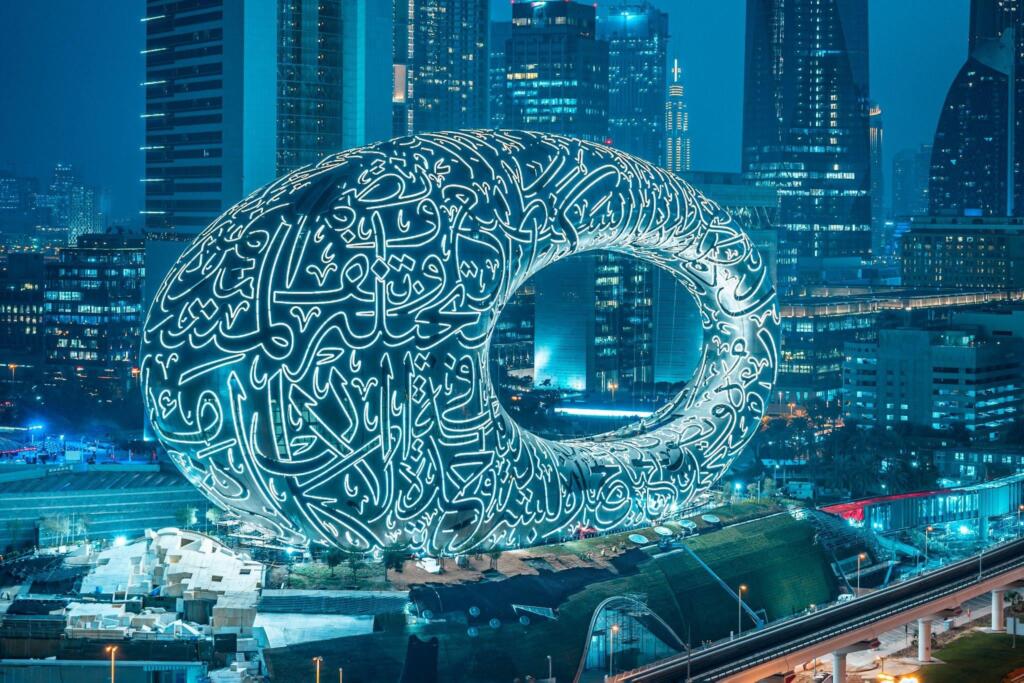
Dubai welcomes approximately 16,000,000 visitors annually with an impressive 16% rate of return, making it a highly sought-after destination. In comparison, Bangkok (Highly ranked on Nomad List) attracts approximately 23,270,600 visitors with a return rate of 19%. Dubai’s popularity is attributed to various factors, including;
- its modern architecture and iconic landmarks
- luxurious shopping and entertainment options
- excellent safety and security measures
- stunning beaches and outdoor activities
- It’s status as a multicultural city
Cost of living and cost of living arbitrage
Dubai is often considered an expensive destination, for many people from third-world countries, and this is for several valid reasons:
- Its location as a prominent commercial hub makes it a desirable location for businesses, which can increase the cost of goods and services.
- Most products and resources are imported, which adds to the cost.
- The majority of the workforce in Dubai is made up of expatriates who are paid higher salaries than locals, contributing to the overall high cost of living.
- Many people living in Dubai use it as a transit hub, which can add to the cost.
Despite these factors, Dubai’s cost of living is actually cheaper than that of several first-world cities like New York and Zurich. For instance, to maintain the same standard of living, you would need approximately $5,226.2 (19,195.8 AED) in Dubai, compared to $9,100.0 in New York (assuming rent is paid in both cities). Similarly, to maintain the same standard of living, you would need approximately 4,926.2 Fr. (19,192.2 AED) in Dubai, compared to 8,000.0 Fr. in Zurich (assuming rent is paid in both places).
| Item | Dubai | Zurich |
| consumer prices (without rent) | 48.1% lower | higher |
| consumer prices (with rent) | 40.7% lower | higher |
| rent prices | 25.6% lower | higher |
| restaurant prices | 39.7% lower | higher |
| groceries | 59.3% lower | higher |
| local purchasing power | 1.2% higher | lower |
Accommodation in Dubai
Dubai offers a variety of accommodation options for digital nomads, ranging from luxury hotels to shared apartments and co-living spaces.
Here are some of the popular options:
Hotels
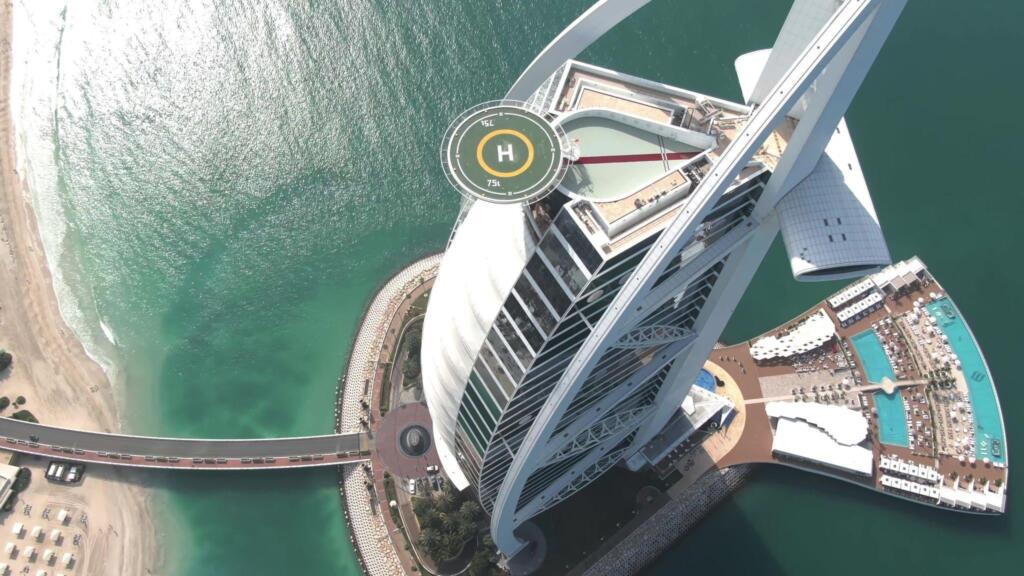
Dubai boasts some of the world’s most elegant hotels, including the Burj Al Arab and the Atlantis. These hotels cater to the needs of digital nomads by offering excellent amenities and services, including high-speed internet, workspaces, and meeting rooms.
No doubt, Burj Al Arab and the Atlantis are pricey and may be unfavorable for a nomad keen on saving. No worries though, because you can still find a cheaper hotel in the city. Nomad List data shows that the city’s median hotel price is about $1500 per month and $72 per night. Of course, you can still find better deals through real estate platforms, including booking.com
Serviced apartments
Serviced apartments in Dubai are popular for digital nomads who prefer more privacy and independence. These offer fully furnished apartments with equipped kitchens, high-speed internet, and housekeeping services.
They include:
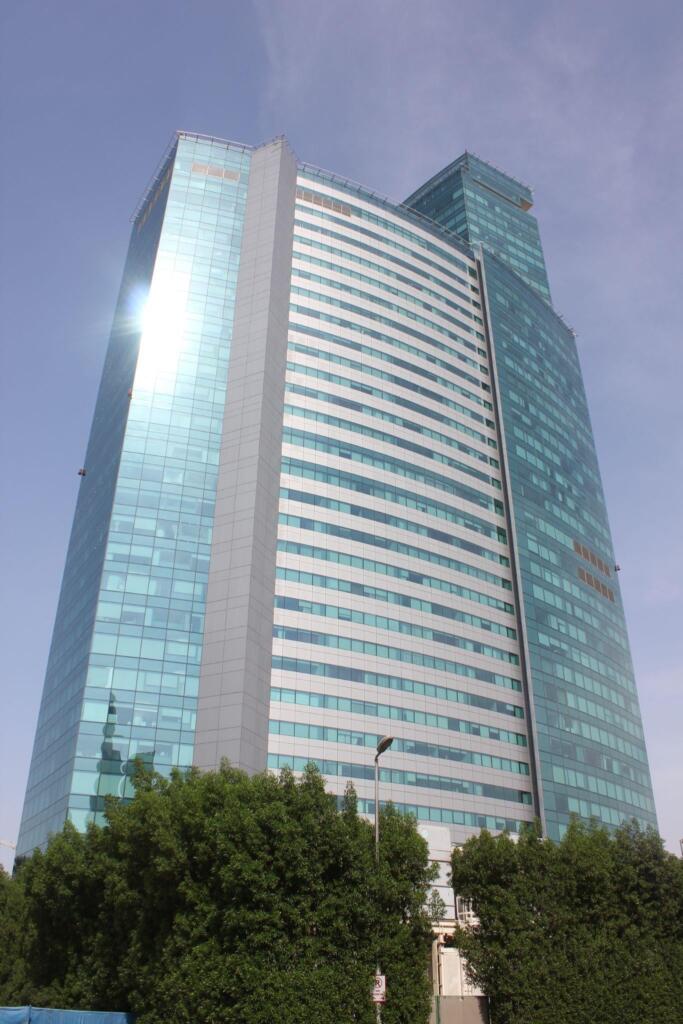
- Avani Palm View Dubai Hotel & Suites
- Jumeirah Living World Trade Centre Residence, Suites, and Hotel ApartmentsDAMAC Maison Canal Views
A one-bedroom studio in the city center goes for about $1634 per month. You may discover more serviced apartments at booking.com and related platforms.
Co-living spaces
Dubai has a growing number of co-living spaces designed specifically for digital nomads. These spaces offer shared accommodation with private bedrooms and shared common areas, such as kitchens, workspaces, and lounges.
Hive Colive
Dubai’s Hive Colive is a revolutionary co-living space that provides a new level of convenience for long-term stays instead of the city’s fancy hotels. Located in Jumeirah Village Circle, the Hive Colive offers a flexible rental opportunity to cater to the demands of UAE’s expats and digital nomads who prefer a fast-paced lifestyle.
The building’s amenities are plentiful, including an in-house cafe called One Life, a resident’s lounge, pool, coworking facility, kitchen, fabrication lab, screening, gaming rooms, gym, library, BBQ pits, bin room, laundromat, amphitheater, and storage area.
To promote social activity among its residents, Hive Colive regularly hosts events, creates networking opportunities, and provides access to a members’ app that lets users stay informed about the happenings around the building.
Vonder Co-living
Vonder Coliving, Dubai, has recently unveiled a revolutionary concept of co-living that will surely disrupt Dubai’s housing market. The company has re-energized some of the most vibrant parts of the emirate to offer all-inclusive, furnished apartments that can house up to three bedrooms.
One of the standout features of Vonder Coliving’s apartments is their open-plan interior, which is flooded with natural light thanks to floor-to-ceiling windows. The classy decor adds a touch of sophistication to the living space, with some apartments even featuring balconies, walk-in closets, and kitchen islands.
The flats at Vonder Coliving start at around AED13,000 to AED20,000 monthly, depending on their size. However, this price includes on-site parking and access to transport links, with a metro station just a stone’s throw away.
Vonder Coliving also boasts an impressive range of amenities to ensure you have a comfortable and enjoyable stay. These include a rooftop pool and fitness studio managed by a 24/7 concierge and security service.
Airbnb
Airbnb is another popular option for digital nomads in Dubai, offering a wide range of apartments, villas, and rooms for short-term or long-term rentals. It is more favorable if you’re looking for a more local experience and want to live in a residential neighborhood.
Nomad List data captures the Airbnb median price at $3526 per month and $116 per night. However, prices can vary depending on the location and the season, so booking in advance and comparing prices is important.
Digital nomad neighborhoods
With its modern infrastructure, reliable internet connectivity, and entrepreneurial spirit, Dubai offers an ideal environment for remote workers. Here are some neighborhoods that are particularly well-suited for digital nomads
Downtown Dubai
This is one of the most popular neighborhoods for digital nomads in Dubai. It offers a lively and vibrant atmosphere, with plenty of coffee shops and restaurants.
Let’s sample a few reasons why you may want to consider this neighborhood;
Central Location: Dubai downtown is at the city’s center, making it easily accessible to all major areas. It is well-connected to public transportation, including the Dubai Metro, and has easy access to major highways.
Lifestyle: It is a lively neighborhood with a dynamic nightlife, excellent dining options, and world-class shopping experiences. You can enjoy a relaxing and luxurious lifestyle while being productive and focused on your work.
Accommodation Options: This neighborhood offers a range of accommodation options, including serviced apartments, hotels, and co-living spaces. You can choose the type of accommodation that suits your budget and lifestyle.
It’s a Business Hub: Downtown Dubai is a thriving business hub with several multinational corporations, startups, and coworking spaces. This allows you to network and collaborate with other professionals in the area, making it an ideal place to grow your business.
Dubai Marina
This trendy waterfront neighborhood is popular with locals and expats. It offers stunning views of the ocean and the city skyline and is home to some of Dubai’s most luxurious residential and commercial properties. You will certainly appreciate the neighborhood’s excellent internet connectivity and coworking spaces.
Jumeirah Beach Residence (JBR)
JBR is a lively cosmopolitan neighborhood that offers a unique blend of beachfront living and urban convenience. It hosts a variety of cafes, restaurants, and shops, as well as a bustling street market. You will appreciate the neighborhood’s relaxed and laid-back atmosphere and many outdoor work and relaxation spaces.
Business Bay
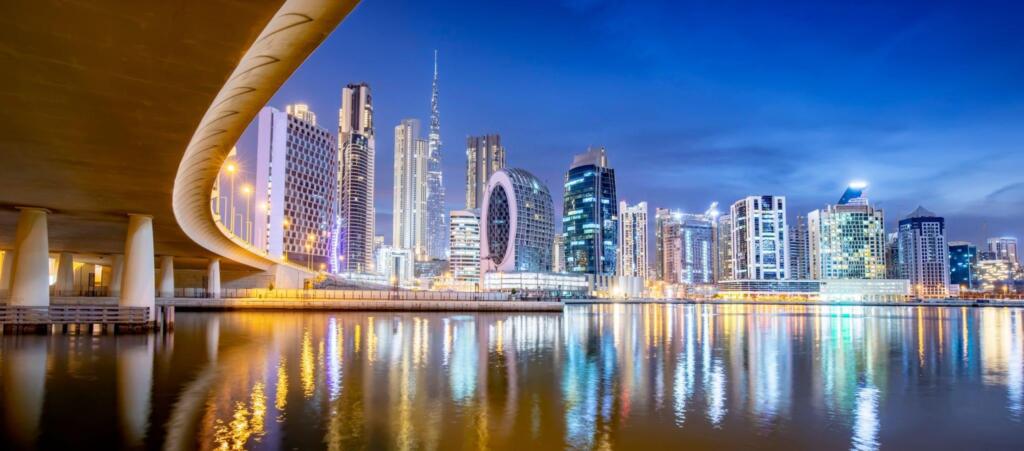
Business Bay is a rapidly growing neighborhood, quickly becoming one of Dubai’s most important business districts. It offers excellent transport connections and is home to various modern office buildings, coworking spaces, and serviced apartments. You will appreciate the neighborhood’s dynamic and entrepreneurial spirit and its many networking opportunities.
Dubai Internet City
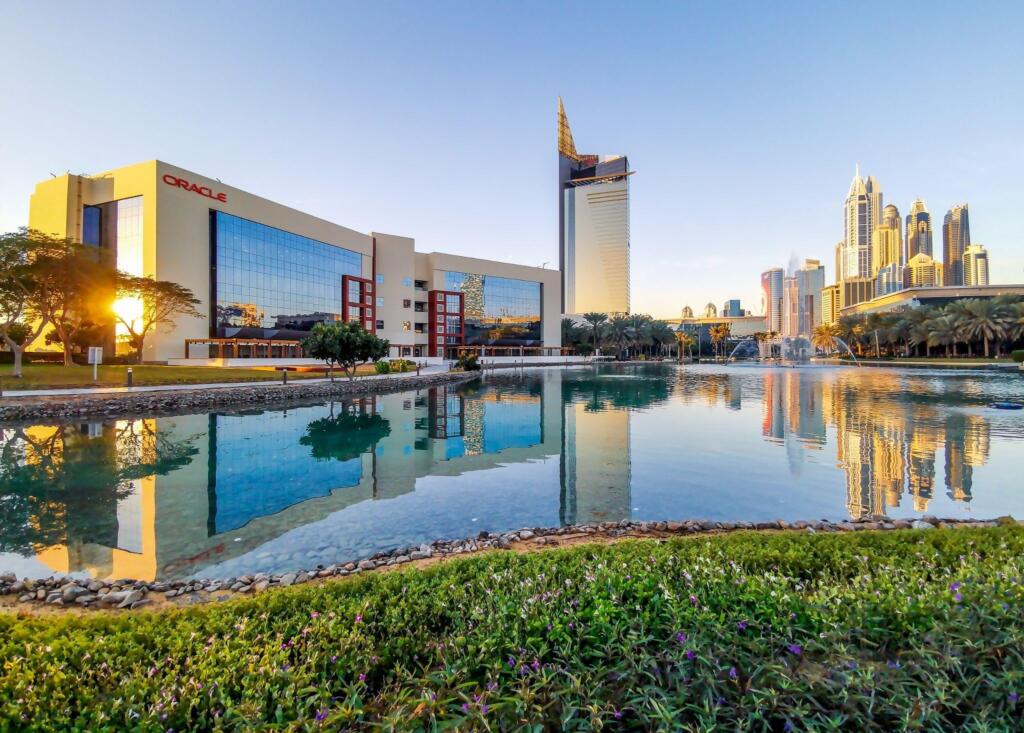
Started in 2000, this dedicated business park hosts many of Dubai’s leading tech companies and startups. It offers a dynamic and innovative environment for you to network and collaborate with other like-minded professionals. The neighborhood also has various coworking spaces, incubators, and accelerators.
Dubai offers many other neighborhoods ideal for digital nomads, each with unique character and amenities. Whether you’re looking for a vibrant and bustling urban environment or a more relaxed and laid-back atmosphere, this city has something to offer everyone.
Utilities
In Dubai city, the cost of utilities for a basic 85m2 apartment, which includes electricity, heating, cooling, water, and garbage, is approximately 729.39 AED (about $200) per month. However, the cost can range anywhere from 500.00 AED (about $140) to 1,200.00 AED (about $330) depending on the apartment’s location, size, and other factors.
As for mobile tariffs, the cost of one minute of prepaid local calls without discounts or plans is around 0.59 AED (about $0.16). This cost can range from 0.20 AED ($0.054) to 1.00 AED (about $0.27), depending on the service provider and the call destination.
Regarding internet services, a 60 Mbps or more unlimited data plan with cable or ADSL connections costs around 363.93 AED ($ about 100) per month. However, this cost can also vary depending on the service provider and the internet plan’s specifics. The price range for internet services in Dubai city typically falls between 250.00 AED (about $68) to 450.00 AED (about $125) monthly.
The cost of utilities in Dubai city can be quite high generally. Therefore, it helps to budget accordingly to avoid any financial surprises. It is also worth noting that costs can vary significantly depending on the apartment’s location, the service provider, and the specific plan chosen, so it’s always best to do thorough research before committing to any particular service.
Internet Speeds and cost
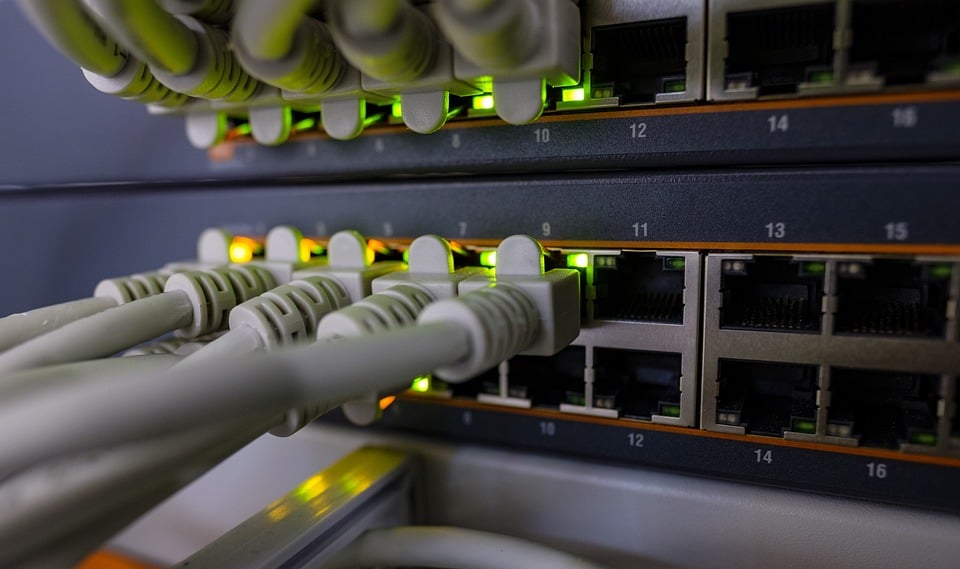
Cable Connection:
Dubai is a global hub of commerce, tourism, and technology, and a key component of its success is its robust and reliable internet infrastructure. The city boasts impressive internet speeds, both for mobile and fixed broadband connections.
According to recent data, Dubai’s median mobile download speed is about 201 Mbps. This means that half of the mobile internet users in the city enjoy even faster download speeds than this. The median mobile upload speed is also impressive, at ≈ 26 Mbps, indicating that users can quickly upload content, such as photos and videos, to social media platforms and other online services.
Additionally, the median mobile latency in Dubai is only 19 ms, which is very low and indicates that users experience very little delay or lag when using mobile internet services.
For fixed broadband connections, the median download speed is ≈ 159 Mbps. The median upload speed is also impressive, at ≈84 Mbps, indicating that users can quickly and easily share large files, such as videos and images, online. The fixed internet latency is also very low, at just 6 ms, indicating that users experience very little delay or lag when using fixed broadband services.
The internet speeds in Dubai are generally impressive, with mobile and fixed broadband connections offering high speeds and low latency. This is a key factor in the city’s continued growth and success as a global business and technology hub.
Best coworking spaces
Dubai typically offers some of the best coworking spaces in the world. According to Nomad List, a coworking hot desk costs about $150 monthly.
Here are some of the top coworking spaces in Dubai for digital nomads:
WeWork: This is a global coworking space with several locations in Dubai. They offer modern, stylish workspaces with all the necessary amenities, such as high-speed internet, printing services, and meeting rooms. They also have an exciting community of entrepreneurs and freelancers, making it a great place to network and collaborate.
The Coworking Popup: Located in the heart of Dubai, The Coworking Popup is a creative coworking space that offers a unique and inspiring environment for digital nomads. They have a range of workspaces available, from hot desks to private offices, and offer flexible membership plans to suit different needs. They also have regular events and workshops, making it a great place to learn and grow.
Regus: Regus is another global coworking space with several locations in the city. They offer a range of workspaces, from private to virtual offices, and have all the necessary amenities, such as high-speed internet, printing services, and meeting rooms. They also have a global network of workspaces, enabling digital nomads to work from anywhere.
Nook: Nook Coworking aims to assist professionals in Dubai’s sports, fitness, and wellness industry. Through its partnership with DMCC, which has been recognized as the world’s leading free zone, Nook provides the most cost-effective options for embarking on (or restarting) your entrepreneurial path.
The Cribb: The Cribb is a boutique coworking space that offers a cozy and comfortable environment for digital nomads. They have a range of workspaces available, from hot desks to private offices, and offer flexible membership plans to suit different needs. They also have a community of like-minded individuals, making it a great place to network and collaborate.
Dubai offers various coworking spaces for digital nomads with unique features and benefits. Whether a freelancer, startup, or entrepreneur, you will find a coworking space that meets your needs and helps you grow your business.
The Crypto Community
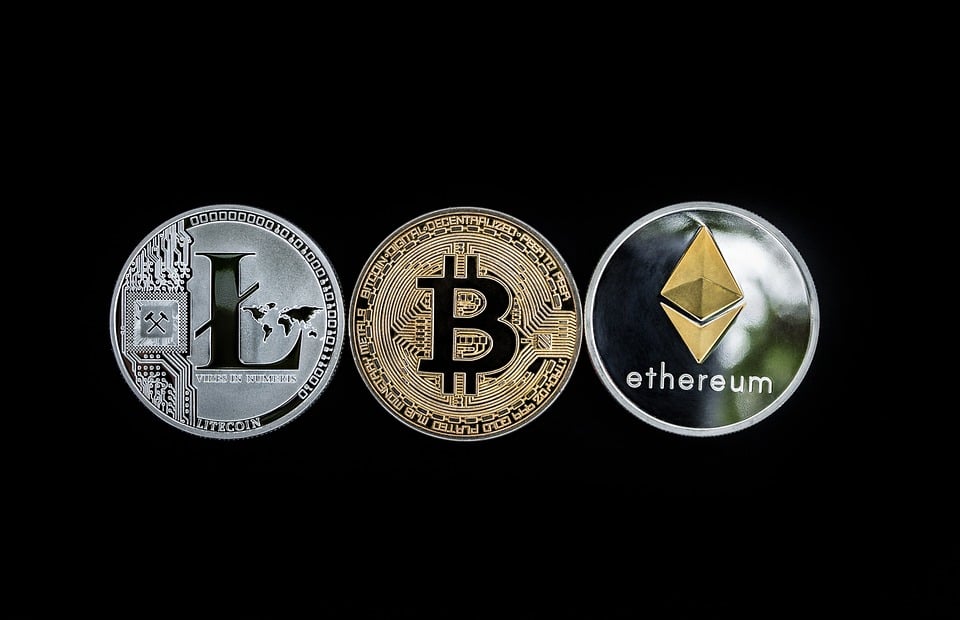
Cryptocurrency :
Dubai has emerged as a major hub for blockchain and cryptocurrency, with the government actively promoting the adoption of these technologies in various sectors. In 2016, the Dubai government launched the Dubai Blockchain Strategy to make Dubai the world’s first blockchain-powered government by 2020. The strategy focuses on three main pillars: government efficiency, industry creation, and international leadership.
Dubai has also witnessed the launch of several blockchain and cryptocurrency initiatives, including the world’s first government-issued cryptocurrency, the emCash, which is aimed at enabling secure and seamless transactions in the city. Additionally, Dubai is home to several blockchain-based startups and companies working on innovative solutions in various sectors, such as real estate, healthcare, and finance.
The Dubai Multi Commodities Centre (DMCC) has also launched a cryptocurrency platform called the DMCC Crypto Centre, which offers various services, including cryptocurrency trading, custody, and tokenization. Moreover, Dubai has hosted several blockchain and cryptocurrency conferences and events, which have attracted global participants and experts in the field.
Clearly, Dubai is fast becoming a global hub for blockchain and cryptocurrency, with the government and private sector actively promoting the adoption of these technologies in various sectors.
What is the legal status of cryptocurrencies in Dubai?
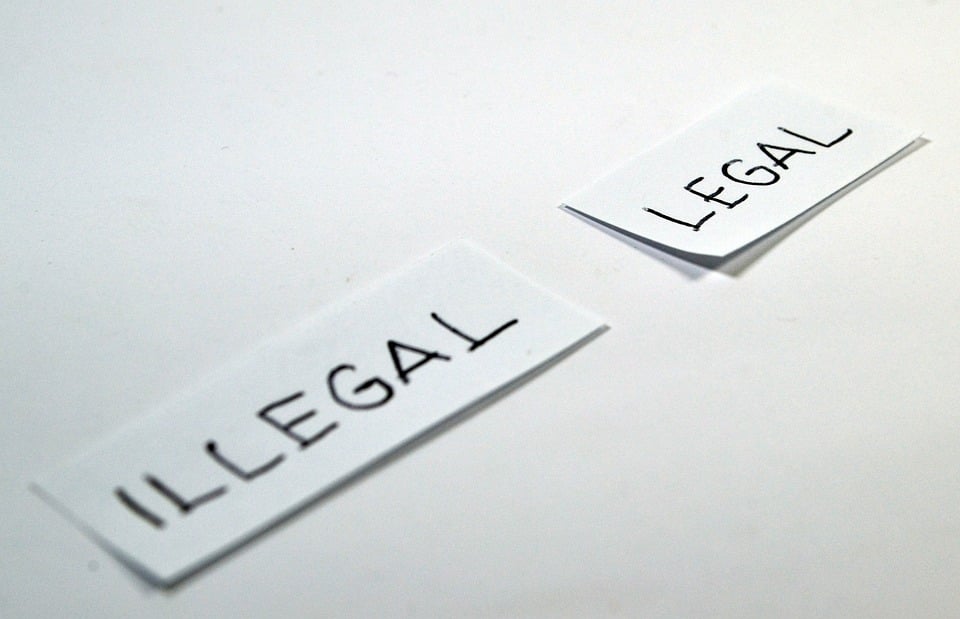
Legal or Illegal:
Top Cryptocurrencies, such as Bitcoin and Ethereum, have gained increasing popularity around the world in recent years, with Dubai joining the list of countries that have embraced them. The legal status of cryptocurrencies in Dubai is largely positive.
For example, In September 2021, the Dubai Multi Commodities Centre (DMCC) announced the launch of a regulatory framework for businesses engaged in cryptocurrencies and other digital assets. The framework aims to provide a clear legal structure for these businesses and ensure compliance with international standards.
Additionally, the Dubai Financial Services Authority (DFSA), on November 1st, 2022, issued guidelines for regulating cryptocurrencies and related activities. The guidelines cover licensing requirements, anti-money laundering (AML) and counter-terrorist financing (CFT) measures, and consumer protection.
This far, you can easily tell that Dubai has taken a proactive approach toward regulating cryptocurrencies and developing blockchain technology. The legal status of cryptocurrencies is largely positive, with an open regulatory framework in place to support businesses engaged in these activities.
Taxation
Crypto taxation in Dubai is a topic of great interest for many investors and traders who are interested in the cryptocurrency market. As earlier stated, Dubai has taken a favorable stance towards cryptocurrencies, recognizing them as a legitimate asset class and a potential source of economic growth.
The Dubai tax system is based on a combination of federal and local laws. The federal tax law governs the taxation of companies, while local laws govern the taxation of individuals.
However, Dubai’s crypto obligations can be complex and confusing.
There is no specific law in Dubai that governs the taxation of cryptocurrencies. However, the city’s general tax principles may also apply to cryptocurrency transactions.
For individuals, the main type of tax in Dubai is the value-added tax (VAT). Currently, there is no income tax in Dubai, meaning there is no direct tax on capital gains or trading profits from cryptocurrencies.
However, the lack of income tax does not mean that cryptocurrencies are completely tax-free. For example, if you use cryptocurrencies to buy goods or services, you may be subject to VAT, which is currently set at 5%.
Blockchain startups
Dubai has generally been open and supportive of developing and using cryptocurrencies and blockchain technology. Against such a background, you may expect a robust blockchain startup ecosystem in the city.
Here are Dubai’s notable Blockchain startups
TechGropse: This is a leading app development company that caters to the digital needs of startups, businesses, and well-established enterprises. They use blockchain technology to create secure and reliable mobile applications. Techgropse stands as a stem with its team of UI/UX designers, mobile app developers, and quality analysts, working hand in hand with clients to ensure that the project delivered fulfills every expectation and creates a difference for its users.
Plavno.io: Plavno.io is a blockchain startup providing solutions for businesses to improve operations and reduce costs. They offer blockchain development, smart contract creation, and consulting services. The company is based in Dubai and has a team of experienced developers and consultants.
Blockchaintechs.io: They offer a range of Metaverse and blockchain solutions to businesses. Blockchaintechs.io’s services include blockchain app development, smart contract development, private blockchain development, blockchain consulting, blockchain-based supply chain management, and more.
Spell Systems: This is a custom software development company that offers innovative technology solutions and cutting-edge AI to help businesses meet their software development deadlines. The company uses a range of technologies, including Python, React, Angular, and NodeJS, to create custom software solutions that meet the specific needs of their clients.
Interexy: Specializes in custom software development and IT consulting, focusing on healthcare, mobile, and web technologies. They provide innovative solutions to some of the biggest market giants, such as SAP, Pampers, and General Electric, as well as fast-growing web3 startups. Their team consists of highly skilled and experienced developers, engineers, and consultants who work together to deliver high-quality, reliable, and scalable software solutions.
Are there Bitcoin ATMs/Tellers in Dubai?
According to Coin ATM Radar, there are over four Bitcoin ATMs/tellers in and around Dubai. These machines provide a convenient way for individuals to purchase and sell Bitcoin with cash without needing a traditional bank account.
Let’s discuss a few;
Rixos Premium Dubai Hotel in JBR
The first Bitcoin ATM in Dubai was launched in 2019 by the international cryptocurrency exchange, Bitex. This machine is located at Rixos Premium Dubai Hotel in JBR and allows users to buy Bitcoin using cash or a debit card. The ATM is available 24/7.
The YBETA General Bytes Bitcoin ATM
The YBETA General Bytes Bitcoin ATM in Dubai is a convenient and reliable way to buy and sell various cryptocurrencies. They are located at;
Unit 901, 9th floor – Bay view tower,
Marasi Dr, Business Bay,
Dubai, UAE.
This machine supports many cryptocurrencies, including Bitcoin, Bitcoin Cash, Ether, Litecoin, Dogecoin, Dash, ZCash, and Monero.
The Binary by Omniyat Bitcoin ATM
They are open from Monday to Saturday (10:00 am – 7:00 pm). The machine supports Bitcoin, Bitcoin Cash, Ether, Litecoin, Dogecoin, Dash, ZCash and Monero, and Tether.
The Exchange Tower
The Exchange Tower is a crypto teller point located at The Exchange Tower. You can find them at the following address;
Office 10040, 10th Floor, Exchange Tower, Business Bay,
Dubai 10040,
United Arab Emirates.
Businesses that accept crypto in Dubai
Cryptocurrencies have gained immense popularity as a means of conducting transactions worldwide, with an increasing number of businesses now accepting them. In Dubai, for example, it’s possible to buy real estate using various types of cryptocurrencies. Many outlets across hospitality and several other industries also accept crypto payments.
Digital nomad communities
Dubai city hosts several communities of digital nomads who come together to share their experiences, collaborate on projects, and support each other in their work and personal lives.
Like in other cities, the Dubai community is primarily organized through social media groups. Facebook, in particular, is a popular platform for these groups, which allows members to connect, share information about job opportunities, housing, and other resources, and organize events and meetups.
In addition to social media groups, several coworking spaces in Dubai cater specifically to digital nomads.
Another popular way digital nomads in Dubai come together is through programs and retreats. These programs offer a combination of professional development, cultural experiences, and networking opportunities. They may include workshops, seminars, and training sessions, as well as social events and tours of the city. Some examples of digital nomad programs and retreats in Dubai include the Nomad Summit.
Last but not least, co-living spaces are becoming increasingly popular among digital nomads in Dubai. These spaces provide a combination of accommodation and workspace, allowing people to live and work together in a supportive and collaborative environment. Coliving spaces may include shared apartments, villas, or hostels and often include communal kitchens, coworking areas, and social spaces.
The expat population
As a result of the growing investments and job prospects in Dubai, a significant expatriate community has emerged, comprising the majority of the foreign population in the UAE. According to Global Media Insight’s 2022 report, the total expat population in the UAE reached 8.92 million.
Popular recreational activities and fun spots
Dubai city offers several recreational activities and fun spots for locals and tourists. Let’s sample a few;
Burj Khalifa
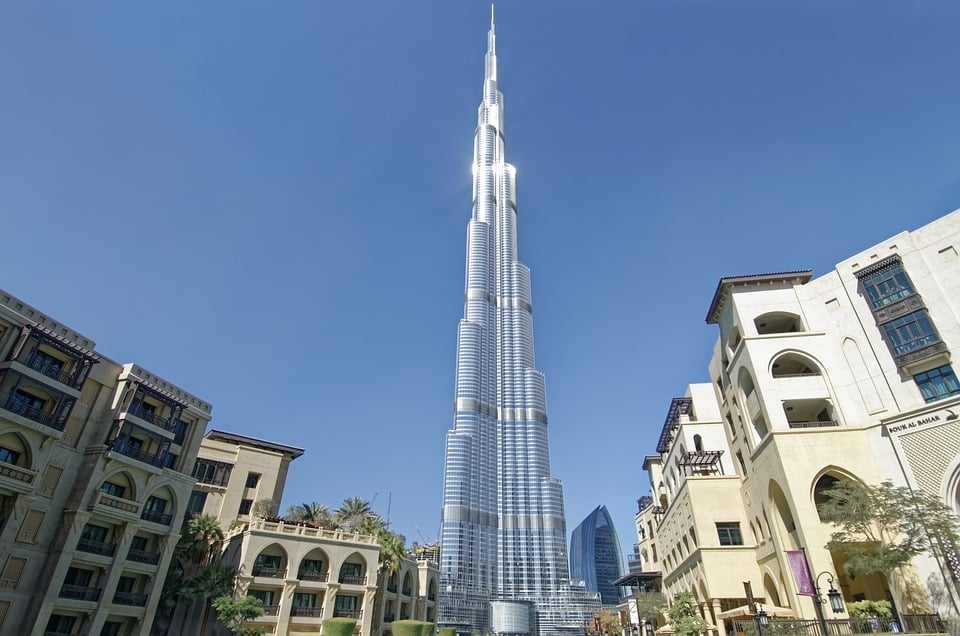
Burj Khalifa skyscraper:
This skyscraper is currently the tallest building in the world, standing at 828 meters (2,716 feet). Designed by Adrian Smith and constructed by Emaar Properties, it features a mix of residential, commercial, and hotel spaces. Burj Khalifa offers stunning city views from its observation deck and has become an iconic symbol of modern architecture and engineering.
The Irish Village Dubai
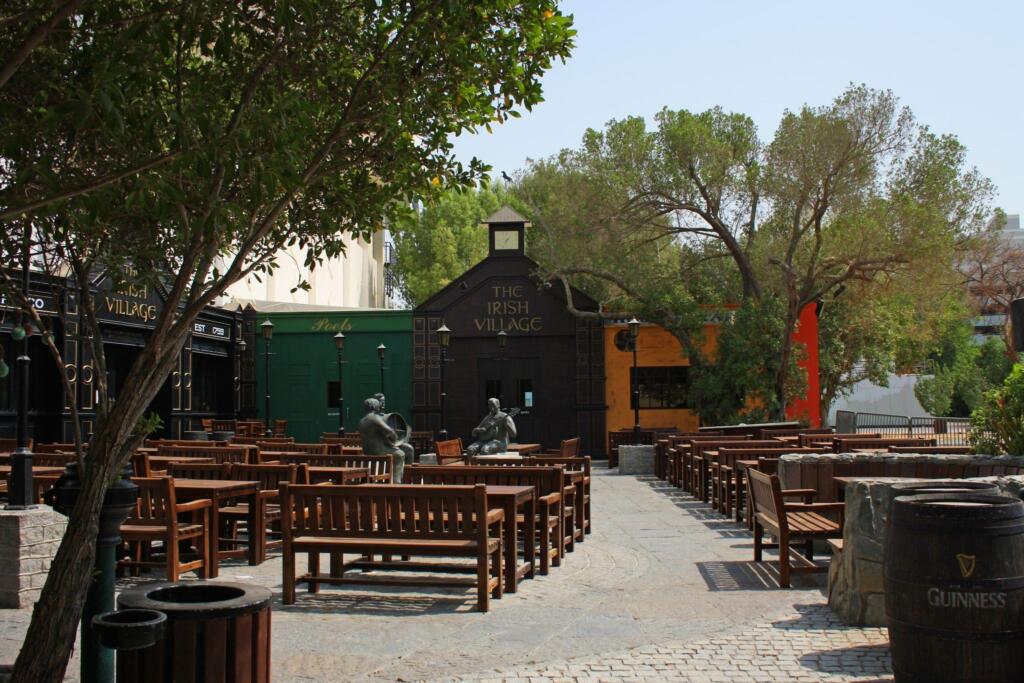
A well-known traditional Irish pub situated in the center of Dubai. Its decor, food, and drinks offer an authentic Irish atmosphere. The pub is a favorite spot for music and sports enthusiasts, hosting live music and showing major sports events.
Ski Dubai
This is an indoor ski resort located in the Mall of the Emirates. The resort features 22,500 square meters of ski slopes, five runs of varying difficulty, a snow park, and other winter sports activities. With real snow and temperatures maintained at -1°C, Ski Dubai offers a unique and thrilling experience for skiing enthusiasts and those seeking a fun winter adventure.
People by Crystal
The People by Crystal is a popular nightclub in the luxurious Raffles Hotel. It boasts a stylish and trendy interior and is well-known for hosting renowned celebrity DJs. It is a go-to destination for those seeking a fun and lively nightlife experience in Dubai.
Dubai Marina
This lively district in Dubai is located along a two-mile stretch of the Arabian Gulf. It features an impressive skyline of high-rise buildings and offers a range of attractions, such as world-class restaurants, cafes, and shops. Additionally, it hosts the Dubai Marina Yacht Club, making it a popular destination for yachting enthusiasts.
Jumeirah Beach
A famous public beach with crystal-clear waters and soft, white sands. Nomads can enjoy various water sports, such as jet skiing and parasailing. You may also take a stroll along the palm-lined promenade. There are plenty of restaurants and cafes, making it a good destination for a day out with friends and family.
Dubai Mall
A world-renowned shopping destination located in Dubai central. With over 1,200 retail stores, 150 restaurants, and abundant leisure activities, the mall attracts millions of visitors annually. Its impressive size makes it one of the largest malls in the world, featuring a 22-screen cinema, an aquarium, and an indoor theme park. The highlight of the mall is its unique indoor ski slope, offering visitors a chance to ski, snowboard, or simply play in the snow regardless of the hot desert climate outside.
Dubai Aquarium and Underwater Zoo
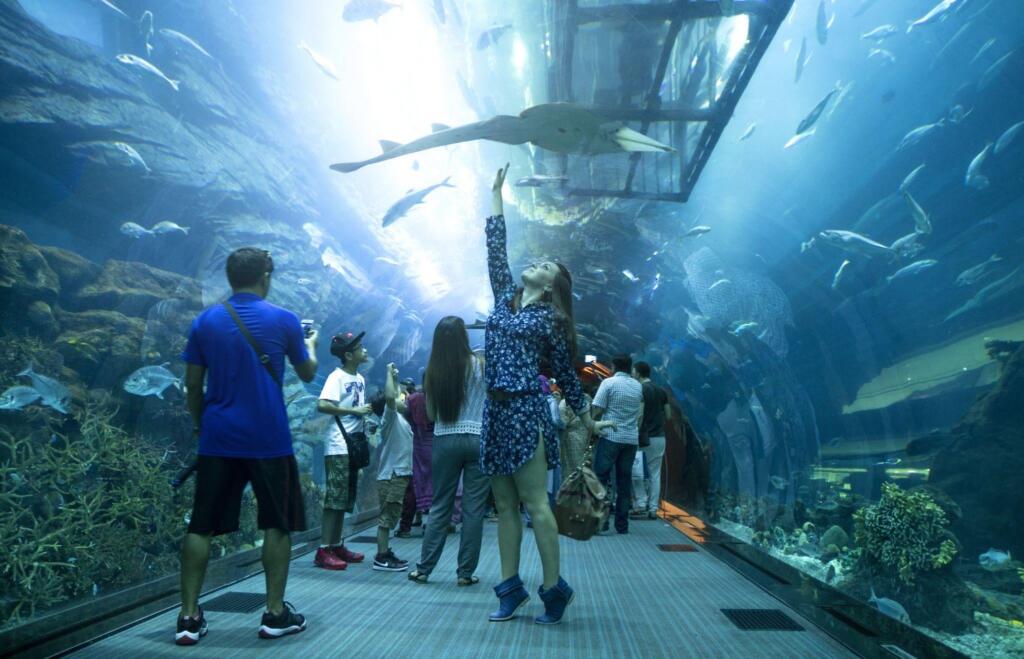
The Dubai Aquarium ranks among the largest indoor aquariums globally. It keeps over 140 species of marine animals, including sharks and rays, and features a ten-million-liter tank that allows visitors to observe these creatures up close. The Underwater Zoo section of the attraction offers a unique interactive experience, allowing visitors to walk through a tunnel while surrounded by water and marine life. The aquarium also offers various educational programs and activities for visitors of all ages.
Dubai Creek
A historic waterway that runs through Dubai city. The area bustles with traditional markets, museums, and historic buildings offering a glimpse into the city’s past. Digital nomads can take boat rides along the creek, explore the spice and gold souks, or visit the Dubai Museum housed in the 18th-century Al Fahidi Fort. Dubai Creek is a must-visit destination for anyone looking to learn more about the city’s rich history and experience its traditional way of life.
Wild Wadi Water Park
Wild Wadi Water Park features an exciting range of water slides and attractions, including the famous Jumeirah Sceirah, a tandem slide that propels riders at thrilling speeds of up to 80 km/h. Other highlights include;
- The Tantrum Alley
- Burj Surj
- Breaker’s Bay wave pool
With its lush tropical landscaping and stunning views of the Arabian Gulf, Wild Wadi is the perfect place for nomad families and thrill-seekers to cool off and have fun in the sun.
Transportation
Dubai offers a variety of transportation options to cater to the needs of residents and tourists. These are the most common transportation options.
Air transport
Dubai International Airport (DXB) is Dubai’s main airport and one of the busiest airports globally. It is the hub for Emirates Airlines and flydubai. It connects Dubai to numerous destinations worldwide, making air travel a popular transportation option for locals and tourists. It takes approximately 20 minutes by car to travel the distance of 15 kilometers or 9.3 miles from the airport to Downtown Dubai.
Railway transport
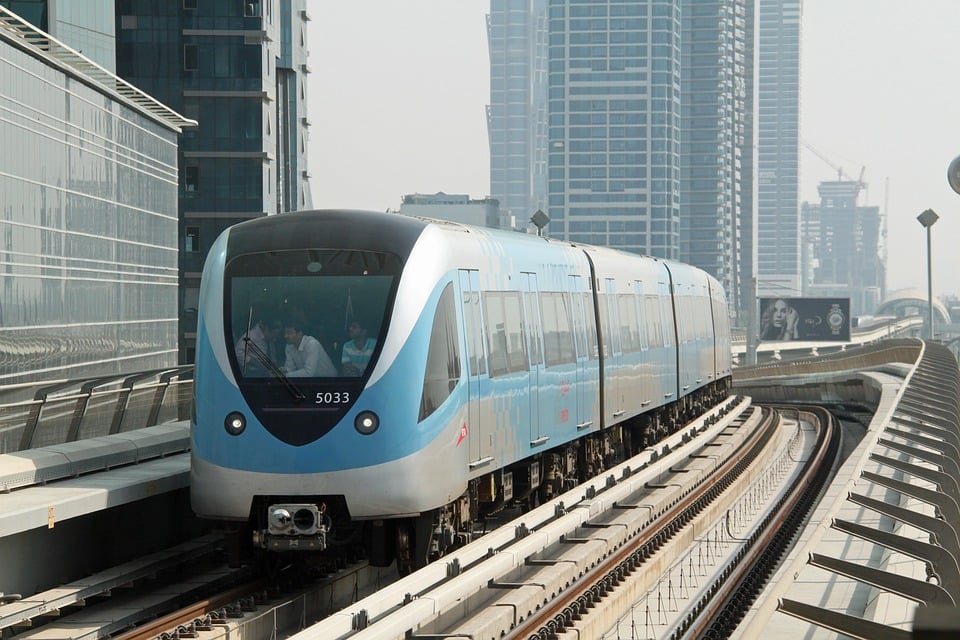
Dubai metro:
Dubai Metro comprises two lines: The Green Line and the Red Line. The Green Line spans 22.5 km (14.0 mi) and consists of 20 stations, numbered 11 to 30, in zones 5 and 6. It runs through Deira and Bur Dubai, parallel to Dubai Creek. On the other hand, the Red Line runs from Rashidiya in the east to Jebel Ali in the west and mostly follows Sheikh Zayed Road. The Dubai Metro is fully automated and runs on the following schedule.
- Monday – Thursday: 5:00 am – 12:00 am
- Friday: 5:00 am – 1:00 pm
- Saturday: 5:00 am – 12:00 am
- Sunday: 8:00 am – 12:00 am
These Timings may vary during national and official holidays and events.
Road transport
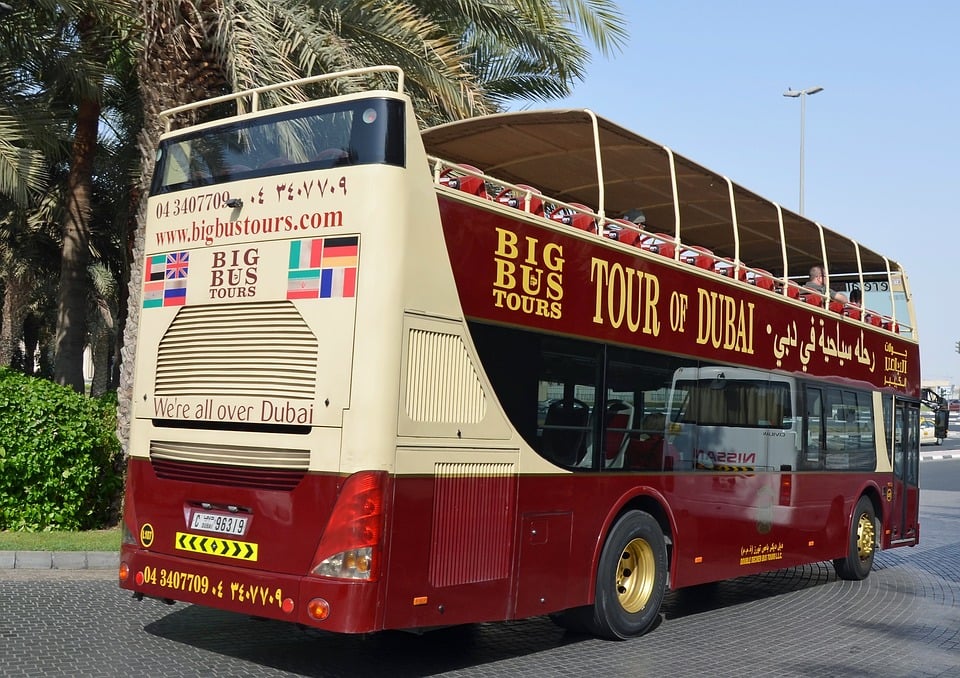
Dubai has a well-developed road network, complete with highways and expressways connecting the city to other emirates in the UAE. The road network includes the Sheikh Zayed Road, which is the city’s main arterial road, and the Dubai-Abu Dhabi Highway.
With such a robust road network you can also expect a well-developed bus transport system that covers various areas of the city. The bus network is operated by the Roads and Transport Authority (RTA), which ensures that the system is reliable and efficient for commuters.
The Dubai bus transport system operates on numerous routes that cover various parts of the city, including residential areas, commercial districts, and tourist destinations. The buses run seven days a week, with timings varying depending on the route and the day of the week.
These buses are modern and well-maintained, with air conditioning and comfortable seating. They are classified as
- Metro feeder buses
- Trailer buses
- Regular buses
- Double-decker buses
They are also equipped with facilities such as USB charging ports, free Wi-Fi, and CCTV cameras for safety.
The bus fares in Dubai are affordable and vary depending on the distance traveled. You can pay your fare using a Nol Card, which is a prepaid smart card that can be topped up at various locations across the city.
The RTA also offers various special services for commuters, including dedicated women’s and Gold Class buses. The women’s buses are designed exclusively for female passengers, with female drivers and separate seating areas. The Gold Class buses provide a more luxurious travel experience, with leather seats and additional amenities.
In addition to the regular bus services, the RTA also operates a night bus service that runs from 11:30 pm to 6:00 am, ensuring that commuters can travel safely at any time.
Taxi services
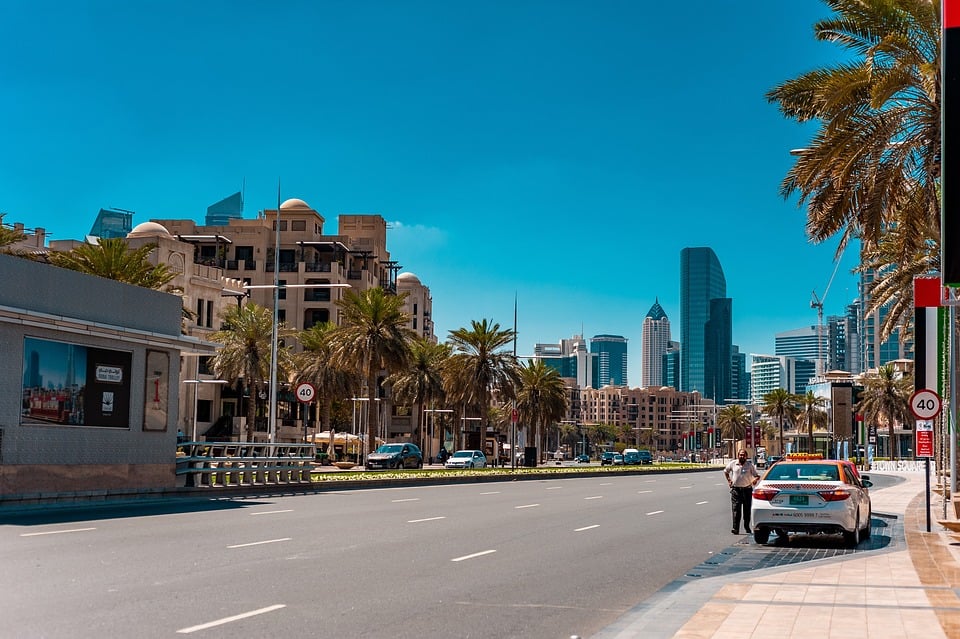
An app-hailing taxi by the roadside :
Being a popular tourist destination, you can certainly expect Dubai to offer a wide range of taxi options. Let’s highlight a few of them.
Dubai Taxi Corporation: This is Dubai’s official taxi service, and it offers comfortable and reliable transportation services at affordable rates. The taxis are operated by licensed drivers who are trained to provide excellent customer service. These vehicles are equipped with GPS systems, for efficient navigation, ensuring you reach your destination on time.
Uber: The Uber ride-hailing service offers affordable transportation services to any location within the city. The service is available anytime, and you can book a ride using the Uber app.
Careem: Careem is another ride-hailing service in Dubai, and it offers a variety of transportation options, including economy, business, and luxury cars. The service is available 24/7, and you can book a ride using the Careem app.
Hala Taxi: Hala is a joint venture between Dubai Taxi Corporation and Careem and offers a wide range of transportation options, including taxis, economy cars, and luxury cars. The service is available 24/7, and you can book a ride using the Hala app.
These taxis and others not listed are available at Dubai International Airport and offer convenient transportation to any location within the city. Generally, there are several options for getting a Dubai Taxi:
- You can call ahead and place an order by dialing a number like (+971 800 88088)
- Hail one on the street. Dubai Taxi cabs are easily identifiable by their cream color, while cabs with a pink trim have female drivers.
- Book through an app for Uber, Careem, Hala, and others in that category.
How safe is Dubai?
Survey teams regularly rank global cities regarding their safety index. Accordingly, Dubai was ranked by economist.com in 2019, and the report was published in the following categories.
| Dubai in 2021 | Dubai in 2019 | |||
| Security Aspect | Rating | Rank out of 60 Cities | Rating | Rank out of 60 Cities |
| digital security | 66.80% | 24 | 74.10% | 24 |
| health security | 75.50% | 13 | 70.50% | 31 |
| infrastructure security | 76% | 32 | 83.20% | 27 |
| personal security | 67% | 25 | 88.60% | 12 |
Based on Numbeo data, Dubai has a very low level of crime, with a score of 12.29. However, there has been a moderate increase in crime over the past three years, with a score of 40.94. In terms of specific concerns, people in Dubai have very low worries about
- home break-ins and things being stolen,
- mugging or robbery,
- car theft,
- things being stolen from their car,
- being attacked,
- being insulted,
- being subject to physical attack due to their skin color, ethnic origin, gender, or religion.
These scores range from 10.66 to 18.57, indicating that people in Dubai feel relatively safe from these types of crime.
Despite these impressive rankings, petty crimes such as pickpocketing and theft continue to occur, particularly in Jumeirah Beach, a popular tourist destination notorious for pickpocketing. Therefore, it is crucial to stay vigilant of your surroundings and watch your belongings, just as you would in any urban area.
Dubai is cosmopolitan with a diverse population, and its cultural and social norms are largely influenced by traditional Arab culture and the modern Western lifestyle. Before landing in this city, take some time to consider the following cultural and social norms.
- Dress Code: While Dubai is a modern city, it is still a Muslim country, and conservative dress is expected in public places. While there, avoid wearing revealing clothing. You should particularly cover your shoulders and knees when visiting mosques or other religious places.
- Public Display of Affection: Public displays of affection are not tolerated in Dubai and can lead to fines or even imprisonment. It is best to keep any romantic displays private.
- Alcohol and Drugs: Dubai observes strict laws against drug use and possession. Alcohol is permitted, but only in licensed establishments. Drinking in public places is prohibited, and public intoxication can result in fines or imprisonment.
- Ramadan: Ramadan is a month-long religious observance where Muslims fast from dawn until sunset. As a visitor, you should be respectful by eating in private during the day.
- Hand gestures: Be mindful of your hand gestures, as some that are acceptable in your country may be considered inappropriate or offensive. For instance, a thumbs-up sign is seen as vulgar and equivalent to an offensive gesture, while the “ok” hand sign is interpreted as a symbol of the devil’s eye. Avoid making rude or obscene gestures, as doing so could result in imprisonment.
- Adult content: and pork products: Make sure there is no pornographic material with you when visiting the United Arab Emirates. Also, don’t visit adult or porn websites in Dubai. Thankfully, the Dubai government has blocked all gambling, dating sites, etc. In the same context, it is illegal to import pig products from other countries to the United Arab Emirates.
- Tipping: Although Tipping is voluntary, it is a common practice here. A 10-15% tip is standard for restaurant service, and a small amount for taxi drivers and hotel staff is appreciated.
- Using hands: Refrain from using your left hand as it is deemed impure in Arab culture due to its association with “body hygiene.” Avoid using it in specific situations, such as when greeting someone, passing food or any item, and eating. Even if you have washed it, it is still regarded as unclean. However, you can drink using your left hand. A left-handed individual must train their right hand before traveling.
- Language profanity: Avoid using offensive language in public settings. This caution is particularly important for individuals who engage in habitual cursing or invoking the “F” word. Arab culture does not condone profanity, so it is crucial to be mindful of your words, especially when conversing with locals. Additionally, making derogatory remarks about Islam, Muslims, or the Prophet is a punishable offense and should be avoided.
- Unmarried couples: Under the Sharia law, unmarried couples are not allowed to live together in Dubai, and cohabitation is considered a criminal offense. This applies to both citizens and visitors of Dubai.
However, the enforcement of this law is relaxed, and many unmarried couples do stay together without facing any consequences. Nevertheless, it is advisable to respect local customs and laws when traveling to Dubai to avoid legal issues.
Political and economic stability
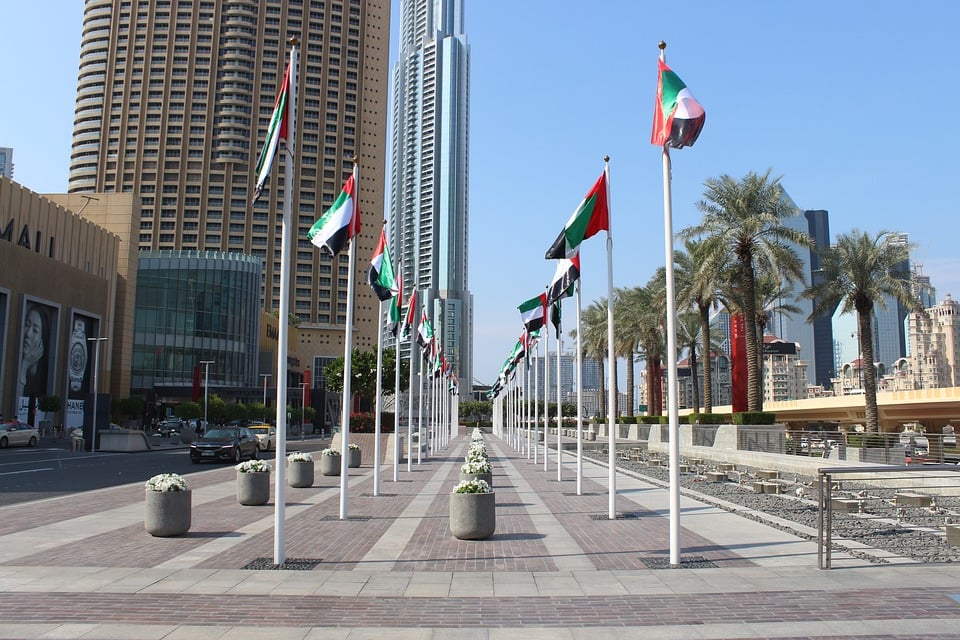
Dubai is a part of the United Arab Emirates (UAE), which has a federal government structure. The UAE’s political system is a federal presidential system, where the President is both the Head of State and the Head of Government. The government operates under the UAE Constitution, which outlines the rights and duties of the federal government, the individual emirates, and their rulers.
The United Arab Emirates is generally considered a politically stable country. In 2021, for example, the World Bank compiled data from officially recognized sources and reported a percentile rank of 66.51% for Political Stability and Absence of Violence/Terrorism.
Economy stability
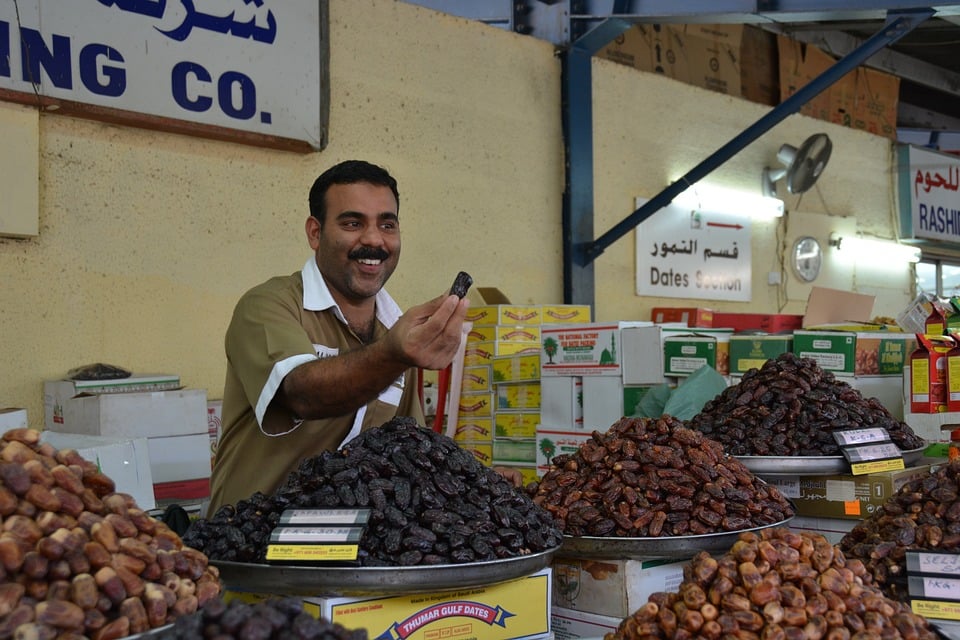
UEA has become known for its economic stability with diversification, strategic location, strong infrastructure, and the country’s visionary leadership being the key contributors. Dubai is particularly known for its business-friendly environment, low tax rates, minimal bureaucracy, and a range of investor incentives. This has helped attract foreign investment and encourage entrepreneurship, contributing to the city’s economic growth.
In 2019, the World Economic Forum unveiled a fresh index called the Global Competitiveness Index 4.0, which assesses an economy’s productivity by analyzing various factors.
The index ranks 141 countries based on their performance across 12 pillars comprising Institutions, Infrastructure, ICT adoption, Macroeconomic stability, Health, Skills, Product market, Labor market, Business dynamism, Financial system, Market size, and Innovation capability.
The 12 pillars encompass 103 indicators, with 70% of the weight assigned to hard data and the remaining 30% based on surveys.
In this report, the UAE ranked the 25th most competitive country worldwide and the leader in the Arab region. With a score of 75 out of 100, the UAE lagged behind the top scorer (Singapore), who achieved a score of 84.8%.
The report acknowledged the UAE’s focus on transport infrastructure, which enabled the country to have one of the most advanced transport systems globally. Additionally, the UAE performed exceptionally well in the stable macroeconomic environment (ranking 1st globally), sound product market (ranking 4th), and infrastructure (ranking 12th). In fact, the Arab nation was among the top 10 countries globally in 34 out of the 103 indicators.
| 12 Pillars | UAE Performance |
| Health | 92 |
| Market size | 34 |
| Product market | 4 |
| ICT adoption | 2 |
| institutions | 15 |
| Financial system | 31 |
| Infrastructure | 12 |
| Labor market | 34 |
| Innovation capability | 33 |
| Skills | 39 |
| Macroeconomic stability | 1 |
| Business dynamism | 31 |
Language and language barriers
Many languages are spoken in Dubai, thanks to the city’s multicultural status. However, the United Arab Emirate’s official language (UAE) is Arabic. English is also widely spoken and used as Dubai’s business and commerce language. In addition to Arabic and English, many other languages are spoken, including Urdu, Hindi, Malayalam, Tagalog, and many others.
Language barriers can arise in Dubai, particularly for those who do not speak Arabic or English. While many people in Dubai speak more than one language, there may still be situations where language barriers arise. For example, some government forms and documents may only be available in Arabic, and some businesses may only have Arabic-speaking staff. However, many businesses in the city have staff who speak several languages, so it is often possible to find someone who can communicate with you in your language (particularly widely spoken languages, including French, German, Spanish, etc.)
In recent years, the Dubai government has made efforts to address language barriers by
- encouraging government employees and anyone interested in taking language training
- promoting the use of translation services in public spaces such as hospitals and government offices
Additionally, many businesses in Dubai offer translation services to their customers to help overcome language barriers.
Dubai city’s healthcare
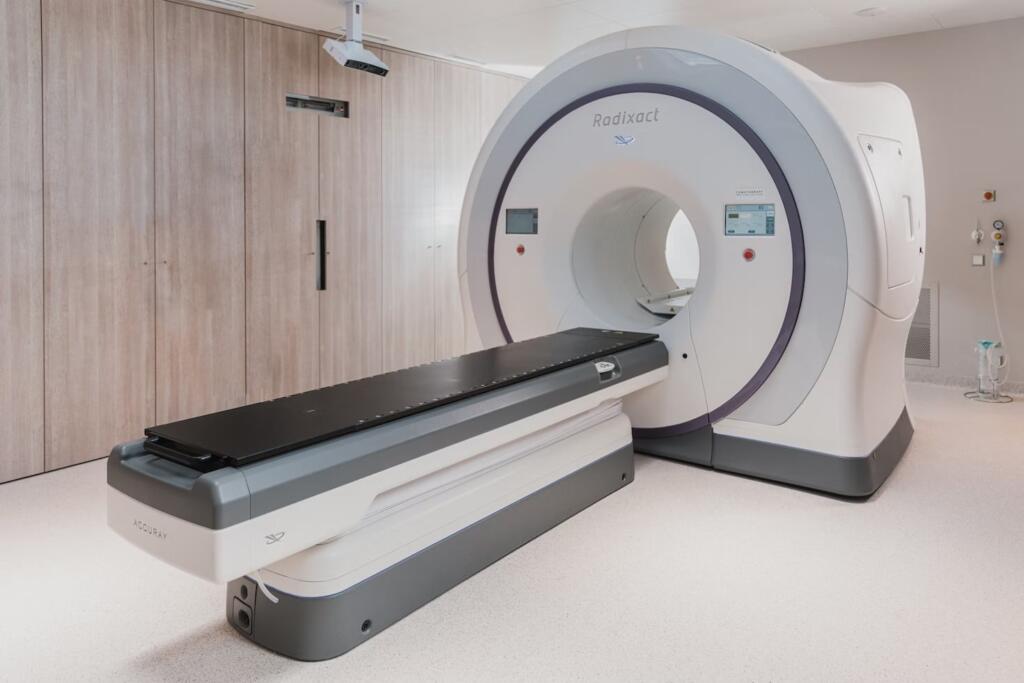
Health equipment:
Dubai’s healthcare system comprises public and private healthcare facilities, with the latter being the majority. The government has invested heavily in building state-of-the-art healthcare infrastructure, including hospitals, clinics, and medical centers, to meet the growing demand for healthcare services.
The Dubai Health Authority (DHA) oversees the city’s healthcare system. It has implemented several initiatives to improve healthcare services, such as the Dubai Health Strategy 2021, which outlines the city’s vision for a world-class healthcare system.
Health insurance for expats and digital nomads
Expats and digital nomads in Dubai have several options for health insurance. The first option is to purchase a local health insurance plan. Several insurance companies in Dubai offer health insurance plans for expats and digital nomads, such as:
These plans typically cover a range of medical services, including inpatient and outpatient care, specialist consultations, and prescription drugs. They also offer varying coverage levels, so choosing a plan that meets your specific needs is important.
Another option is to purchase an international health insurance plan. These plans are designed for people who travel frequently and may not have a fixed country of residence. They offer worldwide coverage, including in Dubai, and typically provide more comprehensive coverage than local health insurance plans.
Examples of international health insurance providers include
For expats and digital nomads who are self-employed or work for a company that does not provide health insurance, it is essential to note that health insurance is mandatory in Dubai. The Dubai Health Authority requires all residents to have health insurance, and failure to comply can result in fines and legal penalties.
Quality hospitals in Dubai
Dubai boasts several high-quality hospitals that offer a wide range of medical services to residents and visitors. They include;
NMC Specialty Hospital
Located in Dubai Investments Park, this hospital offers specialized medical services in neurology, gastroenterology,,cardiology, dermatology, endocrinology, nephrology, orthopedics, pulmonology, and urology. The hospital also has state-of-the-art diagnostic and imaging facilities, a pharmacy, and a laboratory.
Contact
- Phone : +971 2 554 5555
- Email: Info@bareenhospital.ae
Zulekha Hospital Dubai
A multi-specialty hospital located in Al Nahda, Dubai, offering services in, dermatology, oncology, endocrinology, gastroenterology,,neurology,,,cardiology, orthopedics, pulmonology, and urology. The hospital has advanced technology and facilities, including a laboratory, pharmacy, and radiology department.
Contact
- Whatsapp: +971 600524442
- Doha Street, Al Nadha 2, Al Qusais, Dubai, U.A.E.
King’s College Hospital Dubai
Domiciled in Dubai hills, this hospital offers various medical services in orthopedics, gastroenterology, pulmonology, neurology, orthopedics,cardiology and urology.. The hospital has a team of highly qualified doctors and nurses and is equipped with the latest technology, including MRI, CT scan, and ultrasound machines.
Contact
Phone: +971 4 800 7777
Rashid Hospital
A public hospital that is affiliated with the Dubai Health Authority. It is known for its advanced trauma and emergency care services and specialized clinics in areas such as diabetes management and gastroenterology.
Contact:
- Email: info@dha.gov.ae
Telephone (24/7)
- From UAE: 800342(DHA)
- Outside UAE: +971-42198888
American Hospital Dubai
American Hospital Dubai is a private hospital offering medical and surgical services in specialties such as cardiology, neurology, and orthopedics. The facility is accredited by the Joint Commission International (JCI), which is recognized as the gold standard in global health care.
Contact
Tel:0097143775500
Common infectious diseases
As stated on the CDC website, several infectious diseases you may encounter in Dubai include Influenza, Hepatitis A, MERS CoV, Tuberculosis, and COVID-19. Therefore, the health organization advises individuals traveling to this location to receive vaccinations against these ailments and other diseases like Chickenpox (Varicella), Diphtheria-Tetanus-Pertussis, Measles-Mumps-Rubella (MMR), Polio, and Shingles.
Electrical standards
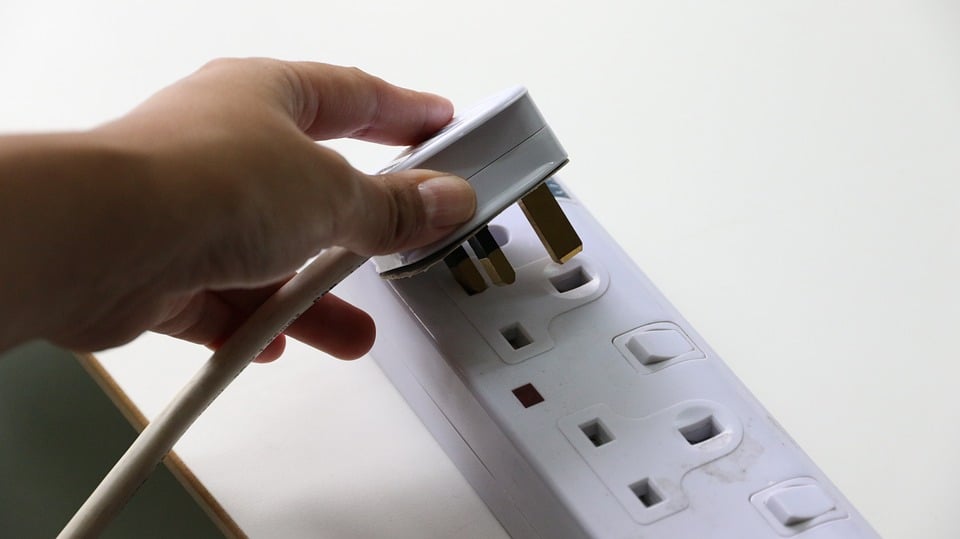
Electric sockets:
Dubai and the UAE have a standard voltage of 220V and a frequency of 50Hz for all power sockets. If your home country’s voltage falls within the range of 220V-240V, your equipment can be used without any issues. This applies to most European countries, Australia, Africa, and Asia.
However, if the frequency used in your home country differs from the standard frequency of 50Hz in the UAE, caution is advised when plugging in your devices.
The electrical plugs and sockets used in Dubai are Type G British three-pin plugs. However, some buildings and hotels may have other sockets, such as Type C or Type D, to cater to international visitors. Therefore, you must check the voltage and plug type before using any electrical appliances to avoid damage to the equipment or accidents.
Mobile and internet plans
Dubai offers many telephone and internet plans to suit different needs and budgets. Let’s look at Etisalat plans, for example.
Etisalat is one of the leading telecommunications companies in Dubai, offering a variety of telephone and internet plans. They offer several packages for prepaid customers that cover local and international calls, SMS, and data. Some of the popular packages include WaselGo, More Time, and Five.
For postpaid customers, they offer a range of monthly plans starting from AED 125. These plans include local and international calls, SMS, and data, with different limits and features depending on the package.
For internet plans, Etisalat offers various options, including standalone internet plans and internet and TV bundles. The internet plans range from AED 299 per month for a 250 Mbps connection to AED 1,599 monthly for a 1 Gbps connection.
Are there other service providers? Of course, they include Du telecommunications, Virgin Mobile, and others. Due to the competition, their plans may not be too different from Etisalat’s.
Payment services infrastructure
Dubai rides on a developed but improving payment services infrastructure that supports various payment options for individuals and businesses. The infrastructure is supported by several government and private entities that work together to provide secure and efficient payment services.
The main payment systems used in Dubai include:
UAE Funds Transfer System (UAEFTS)
UAEFTS is a real-time payment system that allows banks to transfer funds between accounts held at different banks in the UAE. The system is operated by the UAE Central Bank and supports both domestic and international transfers.
Emirates Electronic Wallet (eWallet)
The Emirates Electronic Wallet (eWallet) is a mobile payment system that allows users to store money in a digital wallet and make payments to participating merchants. The system is operated by the UAE Banks Federation and is supported by all major banks in the UAE.
DubaiPay
This is a government-owned payment system that allows individuals and businesses to pay for government services and fees online. The system supports several payment options, including credit and debit cards, e-wallets, and bank transfers.
Visa and MasterCard
These international payment networks are widely accepted in Dubai and are supported by most banks and merchants.
Exchange rates
The Dirham (AED), or the Emirati, is Dubai’s currency. It was introduced in 1973 to replace the Qatar and Dubai riyal. The AED is the official currency of the United Arab Emirates, which includes seven emirates.
- Abu Dhabi
- Dubai
- Sharjah
- Ajman
- Fujairah
- Ras Al Khaimah
- Umm Al Quwain
The Dirham, like crypto stable coins, is pegged to the US dollar, meaning its value is fixed at a rate of 3.67 AED to 1 USD. This has been the case since 1997, and the Central Bank of the UAE maintains the peg.
As of March 13th, 2023, the current exchange rate for the AED to USD is 3.67 AED to 1 USD. This means one US dollar can be exchanged for 3.67 dirhams, and one Dirham can be exchanged for approximately 0.27 US dollars.
Exchange rates can fluctuate based on various factors, including economic and political conditions in the UAE and the US and global market conditions. Additionally, the exchange rate may vary slightly depending on the exchange bureau or bank you use for the transaction.
Climate and seasons
The seasons in Dubai can be divided into two main categories: the hot season and the cool season. The hot season typically lasts from May to September, with temperatures often exceeding 40°C (104°F). During this time, the humidity is also relatively high, making it feel even hotter than it actually is. You should be prepared to stay hydrated and protect yourself from the sun.
The cool season in Dubai runs from October to April, with temperatures averaging 20°C to 30°C (68°F to 86°F). This is the peak tourist season in Dubai, as the weather is mild and pleasant. The cool season is also the time when most outdoor activities take place, such as the Dubai Shopping Festival and the Dubai World Cup horse race.
Dubai’s weather can sometimes be unpredictable, with occasional sandstorms and heavy rain showers. However, these weather events are rare and typically do not last long. In general, Dubai has a sunny and dry climate throughout the year, making it a popular destination for sun-seekers and outdoor enthusiasts.
| Month | Rain | Temperature – High/ Low (°C) |
| January | 1 day | 24°/ 14° |
| February | 1 day | 25°/ 16° |
| March | 1 day | 29°/ 18° |
| April | 0 days | 33°/ 21° |
| May | 0 days | 38°/ 25° |
| June | 0 days | 40°/ 28° |
| July | 0 days | 41°/ 30° |
| August | 0 days | 41°/ 31° |
| September | 0 days | 39°/ 28° |
| October | 0 days | 35°/ 24° |
| November | 0 days | 31°/ 20° |
| December | 1 day | 26°/ 16° |
Popular cuisine

Dubai delicacy:
Dubai is known for its diverse culinary scene that offers a blend of Arabic, Middle Eastern, and international flavors. One popular dish is the traditional Arabic dish, shawarma, which consists of slow-roasted meat (usually chicken or lamb) wrapped in pita bread with vegetables and sauce.
Another staple is the Emirati machboos, a flavorful rice dish with spiced meat or fish. Dubai is also famous for its seafood, with popular dishes like grilled hammour (a local fish) and shrimp machboos.
For those with a sweet tooth, there’s luqaimat, a traditional Emirati dessert made of fried dough balls drizzled with sweet syrup. Dubai’s cuisine offers a unique blend of flavors and influences that will tantalize any palate.
Common Concerns
As a digital nomad, Dubai is an appealing destination with its modern architecture, luxury shopping centers, and high standard of living. However, you should consider the downsides of this city to be sure of what to expect.
First and foremost, Dubai is not a city that is keen on promoting absolute freedom of speech for visitors and can be a major concern for anyone who values this as an inalienable right and liberty. This can also make it difficult for digital nomads to connect with the local community and feel a sense of belonging.
Furthermore, the city is notorious for its high cost of living. Accommodation, food, and transportation can quickly add up, making it challenging to stick to a budget. Additionally, although platforms like SpeedTest have published impressive internet speeds, some nomads reporting on Nomad List feel the internet speeds are slow in certain areas, hindering productivity and creating frustration for those who rely on a stable connection.
Despite its reputation as a tourist hub, Dubai may have little to offer in terms of entertainment for those looking to explore outside of their work hours. The hot temperatures, especially during the summer, can make it difficult to participate in outdoor activities or even leave the air-conditioned comfort of one’s accommodations.
Unfortunately, air quality is also a growing concern in Dubai, which can lead to respiratory issues for outdoors enthusiasts. According to the Numbeo data, Air Pollution in Dubai is at a Moderate level with a score of 50.00. This means that the air quality is acceptable, but some pollutants may be present in the air and may affect people who are unusually sensitive to air pollution.
Making friends and socializing can also be difficult for digital nomads who are unfamiliar with the local culture and language, especially since many people don’t speak English fluently.
Moreover, Dubai is not known for being family-friendly, and some of its laws and cultural norms may not align with the values of all remote workers. Finally, it is worth noting that the city is not always welcoming to members of the LGBTQ+ community, which can create a hostile and unsafe environment for some.
All these concerns notwithstanding, the Emirate state remains a favorite destination for tourists, expats, and digital nomads. If you had packed your bags before reading this guide, please proceed because you’ll for sure have lots of fun!
Always check with local country websites for the most up to date visa, health, tax and travel requirements before entering a country. This article is general information and does not constitute legal advice, check with a legal professional for visas, working visas, applicable tax and crypto laws specific to you.


